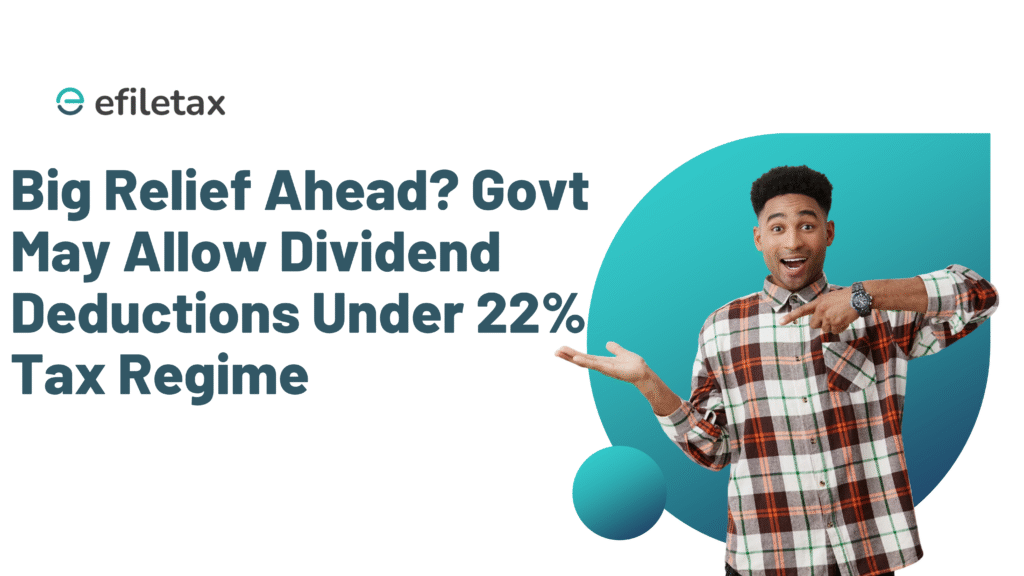
Dividend Deduction Under 22% Corporate Tax Regime May Return
Dividend deduction under 22% corporate tax regime could be back on the table soon. The Finance Ministry is reportedly reviewing the current limitations under Section 115BAA of the Income-tax Act, 1961 — a move that could benefit lakhs of companies in India.
What Is Section 115BAA?
Section 115BAA offers domestic companies a concessional income tax rate of 22% plus surcharge and cess, without claiming most deductions and exemptions.
✅ Introduced via the Taxation Laws (Amendment) Act, 2019
✅ Optional for companies (cannot switch back once opted)
❌ No deductions under Chapter VI-A (except 80JJAA and 80M)
❌ No MAT (Minimum Alternate Tax) applicability
The Current Issue: No Dividend Deduction
Currently, companies opting for Section 115BAA cannot claim deduction under Section 80M if:
- They receive dividends from another domestic company or foreign company
- And redistribute the same as dividends to shareholders
This discourages many holding companies or NBFCs from opting for the 22% tax regime — as they lose the benefit of avoiding dividend taxation twice (economic double taxation).
Why the FinMin Is Considering a Change
According to senior officials quoted in Economic Times, the Finance Ministry is:
- Evaluating investor feedback on the 115BAA regime
- Studying the revival of 80M deduction under Section 115BAA
- Considering amendments in the upcoming Budget 2025
Possible Motivations:
- Encourage group companies to opt for lower tax regime
- Improve corporate earnings and reinvestment potential
- Promote ease of doing business for NBFCs and corporate investors
What Is Section 80M?
Section 80M allows a deduction for inter-corporate dividends to avoid double taxation.
Example:
- Company A earns ₹10 lakh as dividend from Company B
- If Company A distributes this ₹10 lakh to its shareholders in the same year
- It can claim deduction under 80M, avoiding tax on dividend income
But this deduction is not available if the company opts for 115BAA, which is where the current issue lies.
Impact on Indian Businesses
If the government restores dividend deduction under 22% tax regime, it will:
🔹 Benefit holding companies and NBFCs
🔹 Encourage more companies to shift to 115BAA regime
🔹 Simplify tax structures across conglomerates
🔹 Boost net profitability and investor returns
Expert View: A Welcome Correction in the Works
According to tax practitioners, the current policy anomaly acts as a deterrent for tax-efficient corporate structuring.
“Restoring 80M deduction under 115BAA could bring parity and reduce the friction in adopting the new regime,” says a Mumbai-based CA.
It would also help align India’s corporate tax policy with global best practices that discourage double taxation of dividends within group entities.
What Should You Do Now?
✅ Review your company’s current tax regime
✅ Consult with a tax advisor before making the 115BAA switch
✅ Keep an eye on Budget 2025 announcements
Need help deciding the right tax regime?
Efiletax can help your company evaluate, file, and save smartly.
Summary
The Finance Ministry may allow dividend deduction under 22% corporate tax regime by revising Section 115BAA rules. This move could benefit NBFCs and holding firms, making the new tax regime more attractive and easing inter-corporate dividend taxation. A final call is expected in Budget 2025.
FAQs
Q1. Can companies currently claim 80M deduction under Section 115BAA?
No. Companies opting for Section 115BAA are not allowed to claim most deductions, including Section 80M.
Q2. What is the benefit of Section 80M?
It avoids double taxation of dividend income when a company earns dividends and redistributes them in the same financial year.
Q3. Will the 80M deduction apply automatically if restored?
Only if the government amends the law via Budget 2025 or issues a notification restoring this benefit under 115BAA.